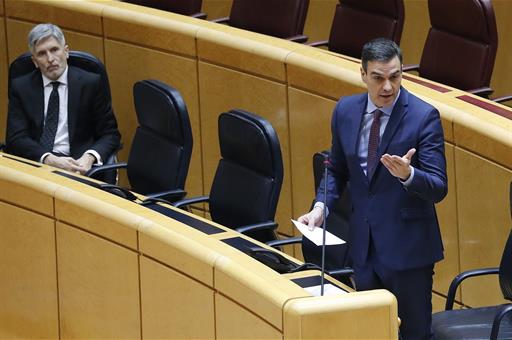Pedro Sánchez argues that extension to state of emergency "will save lives and defend public health"
President's News - 2020.5.5
Upper House of Parliament, Madrid
During his speech at the government control session in the Upper House of Parliament, Pedro Sánchez claimed that the state of emergency is the only "constitutional" instrument that allows the government to maintain the lockdown and restrictions on mobility throughout the country, and that these are measures that are stopping the spread of the coronavirus and allowing "lives to be saved and the public health of our citizens as a whole to be protected".
In his response to a question from the Spokesperson from the People's Parliamentary Group, Javier Maroto, at the plenary session of the Upper House, the President of the Government invited the main opposition party to support the extension to the state of emergency that the government will ask for on Wednesday in the Lower House.
The President of the Government stressed that during the first phase of the de-escalation, the Government of Spain will continue to employ the "dialogue, cooperation, coordination and collaboration" that it has been using with all institutions, and defended his "clear desire to govern through co-decision making with the regional governments".
In this regard, he highlighted that in the eight weeks since the declaration of the state of emergency, a weekly meeting has been held by video-conference with the regional presidents and that, furthermore, the rest of the members of his government have held many sector meetings with the respective regional councillors. By way of example, he stated that on Monday three meetings were held, one on the financing of public transport, another on the distribution of 16 billion euros on health and social expenditure, and another on managing the de-escalation plan and its assessment.
Lockdown is working
The President of the Government asserted that the preparation of the de-escalation plan included support from multidisciplinary experts, not just scientific and epidemiological experts, but also economists, and recalled that a series of indicators has been agreed with the regional governments to evaluate the different phases of the plan.
The President of the Government underlined, in response to the Member of the Upper House for Ciudadanos, Lorena Roldán, that citizens need certainty and security, and hence called not to try out "experiments" about which we do not know how they will play out or their level of efficacy.
"What the government calls for is for this de-escalation to take place under the auspices of the state of emergency and that by the time we reach this new normality we will be able to govern this situation, until such time as we discover a vaccine or a treatment, with other instruments that may serve to legally tackle these questions", he said.
Pedro Sánchez recalled that during the state of emergency, several Royal Decrees have been ratified in the Lower House that seek to protect families, workers, the self-employed and companies.
"The effort the Government of Spain is making in collaboration with regional governments and local authorities is extraordinarily positive, and it is our intention to not leave anyone behind and to create this network to protect families, workers and companies", he reiterated.
This crisis must not be used to abandon debates on the future
The President of the Government argued that the crisis caused by COVID-19 must not be used to abandon "fundamental debates to win the future", such as a more sustainable economy that is more respectful of the environment and the re-industrialisation of the country, nor to "weaken the Welfare State".
He conveyed this response to the Member of the Upper House for the Confederal Left Parliamentary Group, Eduardo Fernández Rubiño, adding that the government remains committed to not leaving anyone behind.
In relation to the effects of the COVID-19 crisis on employment for young people, the President of the Government acknowledged that this has been one of the "worst hit" groups in terms of job losses, and listed some of the mitigating measures, such as unemployment benefits for permanent seasonal contracts, the exceptional unemployment benefit upon the termination of a temporary contract and the unemployment benefit for workers dismissed during the probationary period for a new job, along with the ban on dismissals for causes stemming from the pandemic.
Non official translation





